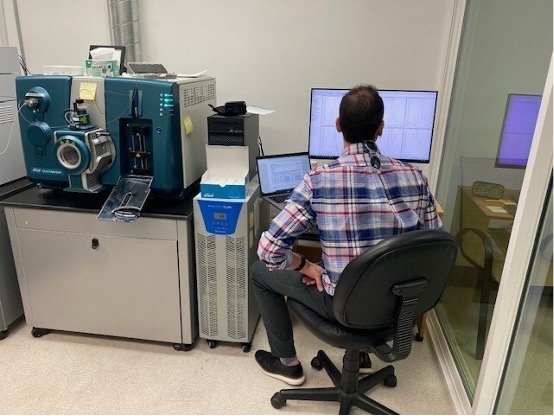Groundbreaking Blood Test Offers Early Pancreatic Cancer Diagnosis
March 6, 2024
Source: drugdu
 586
586
 Pancreatic cancer ranks as the third leading cause of cancer-related deaths, primarily due to its late detection. Early discovery of the disease, while it's still treatable, could significantly impact survival rates. For more than a century, scientists have sought to link cancer with cellular energy production and metabolism. The advent of quantitative mass spectrometry has enabled the testing of many such theories. Now, for the first time, researchers have utilized targeted mass spectrometry to demonstrate that pancreatic cancer stems from changes in cellular metabolism that are detectable using a simple blood test. This method could lead to more precise and earlier diagnoses of pancreatic cancer than currently possible with tumor markers or imaging techniques, potentially paving the way for more timely and appropriate therapeutic interventions.
Pancreatic cancer ranks as the third leading cause of cancer-related deaths, primarily due to its late detection. Early discovery of the disease, while it's still treatable, could significantly impact survival rates. For more than a century, scientists have sought to link cancer with cellular energy production and metabolism. The advent of quantitative mass spectrometry has enabled the testing of many such theories. Now, for the first time, researchers have utilized targeted mass spectrometry to demonstrate that pancreatic cancer stems from changes in cellular metabolism that are detectable using a simple blood test. This method could lead to more precise and earlier diagnoses of pancreatic cancer than currently possible with tumor markers or imaging techniques, potentially paving the way for more timely and appropriate therapeutic interventions.
In contrast to genomic approaches that measure DNA for early detection and often struggle with false positives and negatives, mass spectrometry can measure extremely low concentrations of biochemicals in plasma with remarkable accuracy. Scientists at Metabolomycs (Long Beach, CA, USA) have found that these metabolic signatures in the blood can predict survival rates in patients battling this aggressive cancer. This discovery marks a new direction in pancreatic cancer research, moving beyond genomics and DNA analysis to define the disease as a metabolic disorder.
According to the researchers, variations in amino acids, blood sugars, and lipids define cancer as a state of metabolic stress. Metabolomics, a novel scientific field, employs sensitive tools like mass spectrometry to quantify metabolic byproducts in blood and other bodily fluids. Although mass spectrometry has broad applications, the emergence of targeted mass spectrometry has facilitated its direct clinical use. For the first time, researchers can accurately measure blood levels of metabolic byproducts in real-time. This enabled the researchers to discover highly discriminating ratios that pitted amino acids, the building blocks of proteins, against lipids including triglycerides and sugars like glucose. These findings provide a unique "cancer signature" that differentiates individuals with pancreatic cancer from healthy subjects and can also distinguish pancreatic cancer from other cancer types, such as breast and ovarian cancer.
"What we find is that pancreatic cancers establish a new set of rules for making and using energy that propel these malignant tumors to succeed, all at the expense of the cancer patient's wellbeing," said Dr. Robert Nagourney. "Our findings show that these metabolic tests have the potential to identify pancreatic cancers at the earliest stages when it is still possible to cure the patient. They can also be used to define risk groups that help predict a patient's likelihood of survival."
Source:
https://www.labmedica.com/molecular-diagnostics/articles/294800457/groundbreaking-blood-test-offers-early-pancreatic-cancer-diagnosis.html
Read more on
- Gusekirumab Injection Accepted by CDE, Multiple Pipelines Advancing Simultaneously March 4, 2026
- Yifan Pharmaceutical’s teriparatide injection has been accepted by the CDE (Center for Drug Evaluation), adding a new domestic player to the osteoporosis treatment field March 4, 2026
- //news.yaozh.com/archive/47318.html PD-1 sales surge March 4, 2026
- A major breakthrough! Roche’s oral BTK inhibitor achieves its third Phase III clinical trial victory, a game-changer in the multi-billion dollar MS (manufactured pharmaceuticals) market. March 4, 2026
- GB19 Injection Approved for Clinical Trials of Cutaneous Lupus Erythematosus March 4, 2026
your submission has already been received.
OK
Subscribe
Please enter a valid Email address!
Submit
The most relevant industry news & insight will be sent to you every two weeks.



